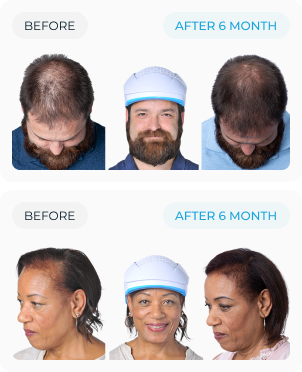Lupus hair loss isn’t just a footnote in a diagnosis — for many, it’s the alarm bell that rings before anything else does. You wash your hair, glance down, and suddenly the drain’s collecting more strands than usual. It’s frustrating. It’s scary. And it’s not all in your head. When lupus goes after your body, it doesn’t skip your scalp. It can attack hair follicles directly, damage the skin beneath them, or even trigger loss through medication side effects.
Still, most conversations about lupus treat hair loss like a minor inconvenience — when in reality, it can be one of the most visible, anxiety-inducing parts of the condition. And because it’s often misunderstood, it also gets mishandled.
Let’s talk about what causes lupus hair loss, the signs worth clocking, and what actually helps when strands start going silent.
What is Lupus?
Lupus is what happens when your immune system forgets whose team it’s on. It’s an autoimmune condition that causes chronic inflammation by attacking healthy tissue — kind of like hiring security that keeps mugging you. There’s no single “type” of lupus either. The most common is systemic lupus erythematosus (SLE), which affects everything from your joints to your kidneys. But then there’s discoid lupus, which zeroes in on your skin. And drug-induced lupus, which is exactly what it sounds like: caused by certain medications.
What all these types have in common is their potential to mess with your hairline. When lupus hits your skin or scalp, the fallout — sometimes literal — can be significant. Inflammation doesn’t just cause joint pain; it can interrupt the hair growth cycle, trigger sudden shedding, or in some cases, lead to permanent follicle damage. You don’t always see lupus on the inside first — sometimes, it shows up in the shower drain.
Lupus and Hair Loss Connection
Yes, lupus causes hair loss, and no, it’s not rare. The damage can show up as non-scarring alopecia (widespread thinning or shedding) or scarring alopecia, which is more permanent and often linked to discoid lupus. Either way, hair loss isn’t “just cosmetic” — it’s often one of the most distressing symptoms, especially since it can hit before a lupus diagnosis is even confirmed. You’re not losing your mind. You’re losing your hair — and there’s a medical reason for it.
How Does Lupus Cause Hair Loss?
Lupus doesn’t use just one method to come for your hair. It’s got a whole toolkit — inflammation, skin lesions, medication side effects, and systemic stress responses. Let’s break down the real triggers.
1. Inflammation and Autoimmune Response
This is where it starts. Your immune system targets your own hair follicles, treating them like invaders. The result is inflammation around the follicles, reduced blood flow, and eventual hair thinning or shedding. The clinical term is “autoimmune-mediated alopecia,” but in simpler terms — your body’s defense system is turning against your scalp. This is a core lupus hair loss cause, especially in SLE. It’s sneaky, slow, and usually not patchy. It’s the “where’d all my density go?” kind of loss.
2. Scalp Lupus and Skin Lesions
Discoid lupus hair loss is more permanent. It comes from raised, scaly lesions that form on the scalp and damage the hair follicle structure itself. This isn’t the kind of loss that just grows back. If left untreated, the inflammation scars the follicle shut — permanently. That’s why early detection and treatment matter. The plaques may start small, but if they reach critical areas (like the crown or hairline), regrowth may not be on the table.
3. Side Effects of Lupus Medications
Sometimes, the cure complicates the symptom. Medications like corticosteroids, methotrexate, and immunosuppressants — all used to treat lupus — can trigger telogen effluvium, where more hairs than usual exit the growth phase. The irony is that the drugs meant to help your immune system stop attacking you may take some strands as collateral damage. This isn’t permanent, but it is common. And it can worsen if doses fluctuate or flare-ups continue unchecked.
4. Telogen Effluvium Due to Lupus Flare-Ups
Lupus flare-ups stress your entire system. And like any major stressor, they can shock your follicles into a mass exodus. This is classic telogen effluvium, where a sudden shift in your internal balance pushes hairs into the resting phase prematurely. The shedding often kicks in two to three months after the initial stress — which means your lupus flare is long over, but the hair loss is just arriving. The good news is this type is usually reversible, but only if the underlying inflammation is kept in check.
Signs of Lupus-Related Hair Loss:
- Diffuse thinning all over the scalp
- Bald patches or coin-sized lesions
- Brittle, broken hairs around the hairline
- Hair shedding after lupus flare-ups
- Scalp redness, itching, or flaking in affected areas
Can Hair Grow Back After Lupus Hair Loss?
That depends on what caused the damage. If the loss is due to inflammation, medication, or telogen effluvium, it’s often reversible — especially if the inflammation is brought under control early. But if there’s scarring (from discoid lupus or prolonged untreated skin lesions), the follicles may be permanently damaged. That’s why lupus hair loss treatment needs to be tailored and timely. You’re not just waiting for regrowth — you’re actively working toward real lupus hair loss recovery.
Treatments and Solutions for Lupus Hair Loss
Managing lupus hair loss isn’t about miracle shampoos. It’s about managing the disease first — and stacking proven strategies to help your scalp recover.
1. Managing Lupus Symptoms
The best lupus hair loss prevention starts with stopping the fire at its source. When you keep flares under control — through medication, stress management, sleep, and nutrition — you reduce the inflammation that destroys your follicles. Skipping meds or letting stress spiral will show up on your head before it hits your labs. Control the disease, and you control the fallout.
2. Topical and Medical Treatments
For scalp lesions or inflammatory patches, corticosteroid creams or injections can calm the storm directly at the root. In systemic cases, hydroxychloroquine (often prescribed for lupus) has shown some promise in halting lupus hair loss symptoms. These aren’t DIY solutions — you need a rheumatologist or dermatologist guiding you. But the right mix can slow, stop, or even reverse inflammation-triggered loss. However, you should speak with your doctor before any treatments.
3. Gentle Hair Care Routine
Your follicles are already on edge — don’t give them more reasons to peace out. Ditch the heat tools. Avoid tight hairstyles. Skip sulfates, heavy fragrances, and stripping alcohols. Opt for sulfate-free shampoos and conditioners that support scalp health. If your product label sounds like a cocktail menu, toss it. A lupus hair loss scalp treatment starts with what you put on your head daily — and it should do more good than harm.
4. Laser Phototherapy
Laser therapy is real science. LPT devices like Theradome helmets use cold red-light lasers to stimulate mitochondrial activity in your hair follicles, improving blood flow and reducing inflammation. It’s FDA-cleared, painless, and one of the few options that supports both lupus hair loss regrowth and prevention — especially in non-scarring cases. It’s drug-free and doesn’t interfere with lupus meds. However, you should speak with your doctor before any treatments.
5. Hair Supplements and Nutrition
Hair can’t grow from thin air. You need building blocks — iron, zinc, omega-3s, and vitamin D. But don’t guess. Test first. Over-supplementing can backfire. Focus on real food — salmon, spinach, eggs, walnuts. Support your scalp like you support your joints. It’s part of the system, too.
Conclusion
Yes, lupus can cause hair loss — through inflammation, medications, stress, and skin lesions. The type of loss (scarring or not) will determine whether regrowth is possible. The earlier you catch and treat it, the better your odds. Don’t wait for chunks of hair to make the decision for you. Speak with your doctor, manage your condition aggressively, and support your hair with proven methods. Lupus hair loss is frustrating — but it doesn’t have to be final.
























